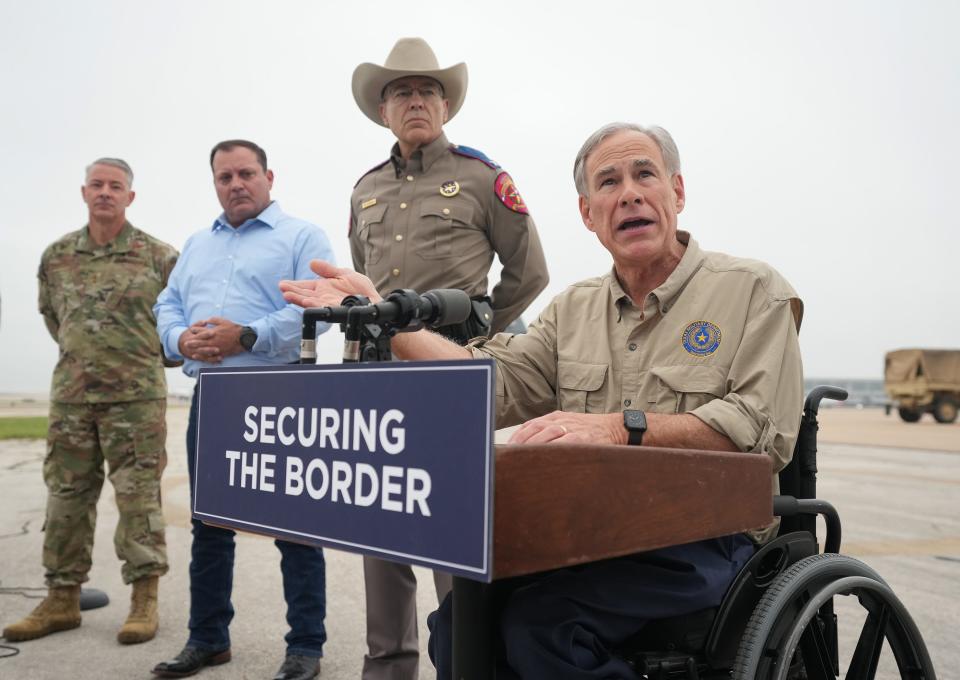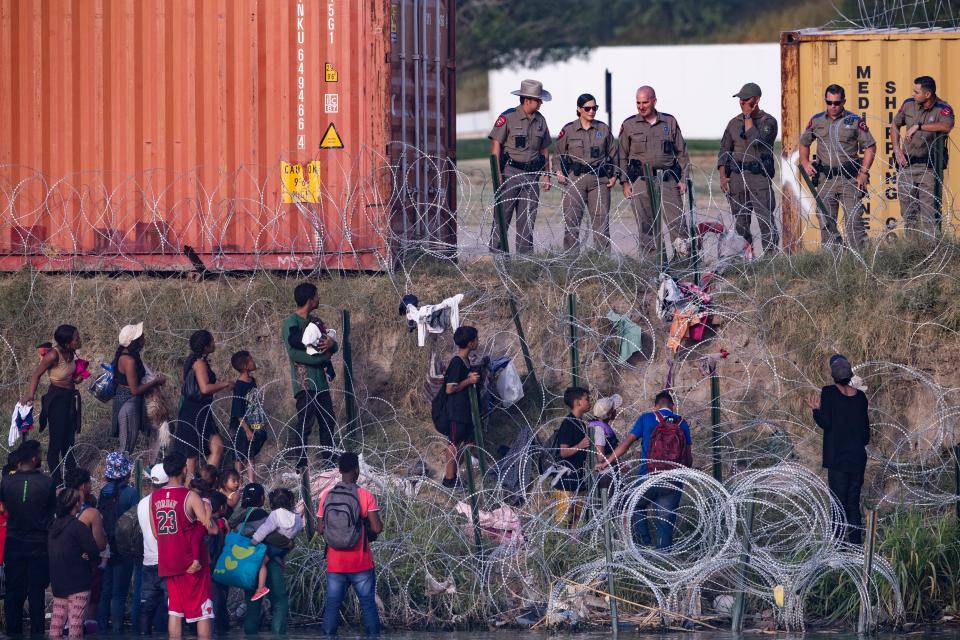Why Operation Lone Star is both expensive and politically popular for Gov. Greg Abbott
- Oops!Something went wrong.Please try again later.
- Oops!Something went wrong.Please try again later.
AUSTIN — The three-paragraph news release that publicly launched Operation Lone Star presented the initiative as one that would do little more than "integrate" the assets of the Texas Department of Public Safety and the state's National Guard to battle the illicit smuggling of drugs and migrants across the Rio Grande.
It was early March 2021, barely six weeks after Democrat Joe Biden ousted Donald Trump from the White House and one year before Gov. Greg Abbott would face Texas Republican voters as he sought a third term on in office.
And now, two years, eight months later and a convincing reelection later, Operation Lone Star has mushroomed into an $11 billion enterprise that has deployed as many as 10,000 Texas National Guard soldiers and 1,500 DPS troopers to the state's southern border, plus an additional 1,700 Guard soldiers and troopers from 13 other states.
And just this month, Texas lawmakers sent Abbott sweeping legislation to empower local and state police agencies to, in effect, act as federal immigration agents with the authority to arrest and initiate deportation the process of people suspected of having crossed into Texas illegally.

From a political standpoint, Operation Lone Star has vaulted Abbott into the national spotlight, some experts say it has allowed the Texas governor to consolidate his power on the home front and to rewrite the rulebook for the relationship between the states and the federal government.
"Abbott is the most visible and influential Republican governor in the country," said Mark Jones, a political science professor at Rice University's James A. Baker III Institute for Public Policy in Houston.
That heightened visibility began its ascent in April 2022 when Abbott began offering migrants who had been granted at least temporary permission to remain in the United State bus trips to cities ruled by Democratic mayors.
The program was immediately derided by the governor's critics as a political stunt sure to backfire. But it was almost immediately embraced by conservative news outlets and soon had those mayors warning that their local social service networks were at risk of unraveling, and some joining the Texas governor's relentless criticism of Biden's policies to curb unlawful immigration.
As of last month, more than 50,000 migrants have been bused from Texas to cities around the nation.
Putting Democrats on defense
In September, New York City Mayor Eric Adams implored Biden to declare a state of emergency at the southern border and said the influx of bused-in migrants will have lasting consequences. “This issue will destroy New York City," Adams said at the time.
More: 'I don’t see an ending to this' NYC Mayor Eric Adams calls influx of migrants a national crisis
Texas Democrats, meanwhile, have sought to portray Abbott and his border initiative as an unconstitutional usurpation of federal immigration authority that is opportunistic at best and cruelly inhumane at worst.
“Operation Lone Star is trampling on the rights of border communities, endangering our economic relationship with Mexico, and violating the basic human rights of asylum-seekers," Congressman Joaquin Castro of San Antonio said in a recent news release.
Congressman Greg Casar of Austin took it a step further, saying "Greg Abbott’s abusive, wasteful, and inhumane Operation Lone Star is a disgrace to our state."

Stepping 'over a line'
Much the harshest criticism of Operation Lone Star is reserved for the policy of lining long stretches of the Texas-side banks of the Rio Grande with prison-manufactured razor wire.
In July, USA TODAY reported that the hospital in the border city of Eagle Pass had treated an inordinate number of migrants, including young children, for lacerations after being ensnared in the coils.
That same month, emails surfaced from DPS medic Nicholas Wingate to a supervisor that Operation Lone Star had "stepped over a line into the inhumane" amid reports that troopers had been ordered to push migrants who had reached the Texas shore back into the river.
More: Texas Democrats in Congress: Biden must assert authority to check Abbott on immigration
"We need to operate it correctly in the eyes of God," Wingate wrote of Operation Lone Star. "We need to recognize that these are people who are made in the image of God and need to be treated as such."
The reports prompted Abbott to push back.
"No orders or directions have been given under Operation Lone Star that would compromise the lives of those attempting to cross the border illegally," Abbott said in a statement.
Meanwhile, Abbott has openly defied the Biden administration by placing a string of buoys in the international river separating the United States and Mexico as a further deterrent to unlawful crossings. The U.S. Justice Department has filed a lawsuit seeking to have the floating barriers removed and named the governor as a defendant.
Abbott has said he's prepared to take the matter to the U.S. Supreme Court, if necessary, in the effort to show he has the authority to take what emergency actions he deems necessary to secure Texas' border with Mexico.
The cost keeps going up
In the early stages of Operation Lone Star, some of the costs were covered by shifting state money from other agencies. Then the Legislature appropriated about $4.5 billion to keep the initiative funded for the two-year budget cycle that ended Aug. 31, 2023.
During this year's regular legislative session, $5 billion was allocated for the present two-year cycle. By this month, the price tag soon expanded by $1.54 billion, much of it earmarked for a Trump-like border wall on private land where property owners agree to the project.
To date, the state has constructed about 11 miles of the wall. The cost to build more could be as high as $20 million per mile.
Other governors 'modeling' Abbott
Joshua Treviño, chief of intelligence and research for the conservative Texas Public Policy Foundation, rejected criticism that with his aggressive and expensive border policies Abbott has veered out if his lane and into territory belonging solely to the federal government. As recently as the early 20th century, he said, it was widely accepted that border state governors could expel immigrants who had no legal standing to enter their states.
"I don't think that Texas or the governor have done anything extra constitutional," Treviño said. "I think they have had to reach back in time a bit to a different era -- not constitutionally different, but just historically different -- to revive and reactivate a lot of the powers that once upon a time everybody understood states generally have."
He also said many Republican governors across the nation, at least in some form, are following Abbott's lead. Governors from as far away as North Dakota, Florida and West Virginia − along the closer-by states of Oklahoma and Arkansas − have dispatched National Guard soldiers to Texas to join Operation Lone Star.
"Without mind-reading too much, (other states) are taking inspiration, if not direct modeling, from what Texas has done with the Texas Military Department forces," Treviño said.
Deployments are sometimes deadly
During a 13-month period ended in October 2022, 10 National guard soldiers died during their Operation Lone Star deployments, and at least four of the death were determined to be suicides. The Texas Military Department now includes a page on its website related to suicide prevention.

One of the soldiers who died was Sgt. Bishop Evans, who in April 2022 jumped in the swift currents of the Rio Grande near Eagle Pass to save struggling migrants who were attempting to cross from the Mexican side. The 22-year old, who was promoted to his rank posthumously, drowned in the river. He had not been issued a floatation device.
Evans was awarded Lone Star Medal of Valor at his funeral, but his family did not qualify for a military death benefit. Lawmakers this year passed legislation to provide a $500,000 benefit to Operation Lone Star soldiers who die in the line of duty. Abbott signed it into law.
Operation Lone Star 'a mixed bag'
Abbott has insisted the numbers show Operation Lone Star has been effective: More than 473,900 apprehensions at or near the border; 34,800 arrests on state criminal charges; 431 million lethal doses of fentanyl seized.
But an examination by the Wall Street Journal in July under the headline, "Texas Spent Billions on Border Security. It's Not Working", casts doubt on the governor's boasts.
The report noted that the state operation accounted for just a fraction of migrant encounters, compared with the Border Patrol’s 850,000 encounters.
“The area of the border most heavily targeted by Operation Lone Star has seen the most rapid increases in illegal border crossings in the state since the operation began,” the newspaper reported. “Thousands of arrests by state troopers under the program have been unrelated to border security, and instead netted U.S. citizens hundreds of miles from the border.”
Alvaro Corral, a political science professor at the University of Texas Rio Grande Valley, said it's difficult to read how people in heavily Hispanic South Texas view Operation Lone Star. Most understand the need for secure borders, but many are troubled by reports of injured migrants and question whether the results are worth the investment, he said.
"I would say it's a mixed bag," Corral said. "I think people acknowledge that something needs to be done about folks that are here undocumented. In terms of Operation Lone Star, I think there's also a recognition that some of these efforts are not the best in terms of deterrence. And that sort of rubs people the wrong way."
Jones, the Rice University professor, said regardless of the cost or what the numbers might show, Operation Lone Star has proven itself an questioned political winner for Abbott. It has allowed the governor to set the narrative of the national debate over immigration while the White House has struggled to articulate its own strategy for controlling the border, he said.
"Abbott is challenging the Biden administration with a position that has overwhelming majority support in the Republican Party, but also majority support nationally," Jones said. "It's a winning issue in Texas, but also in Michigan, and Pennsylvania and Wisconsin.
"I think the Biden administration is passive because it's a no-win issue for them," he added. "Whatever the Biden administration does, it angers someone in the Democratic coalition."
John C. Moritz covers Texas government and politics for the USA Today Network in Austin. Contact him at jmoritz@gannett.com and follow him on X, formerly called Twitter, @JohnnieMo.
This article originally appeared on Corpus Christi Caller Times: Operation Lone Star is expensive and politically popular for Abbott

